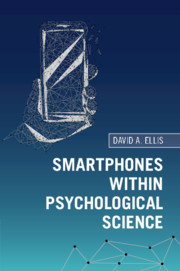Book contents
- Smartphones within Psychological Science
- Smartphones within Psychological Science
- Copyright page
- Dedication
- Contents
- Figures
- Tables
- Preface
- Acknowledgements
- Introduction
- Chapter 1 Smartphone Usage
- Chapter 2 Health and Behaviour Change
- Chapter 3 Social Interaction and Interpersonal Relationships
- Chapter 4 Personality and Individual Differences
- Chapter 5 Cognition
- Chapter 6 Safety and Security
- Conclusion
- References
- Index
- References
Chapter 5 - Cognition
Published online by Cambridge University Press: 11 September 2020
- Smartphones within Psychological Science
- Smartphones within Psychological Science
- Copyright page
- Dedication
- Contents
- Figures
- Tables
- Preface
- Acknowledgements
- Introduction
- Chapter 1 Smartphone Usage
- Chapter 2 Health and Behaviour Change
- Chapter 3 Social Interaction and Interpersonal Relationships
- Chapter 4 Personality and Individual Differences
- Chapter 5 Cognition
- Chapter 6 Safety and Security
- Conclusion
- References
- Index
- References
Summary
Cognitive science has often considered the impact of new technology on childhood development and the ability of digital devices to disrupt attention and cognitive processes. In contrast, the same area has successfully implemented smartphones into existing research practices, which perhaps reflects the methodological training many psychologists working within cognition and perception receive as part of their doctoral studies. For example, standard psychophysical experiments and reaction time tasks have been ported to a variety of smartphones using their built-in web-browser. This has been extended to include the large-scale gamification of traditional cognitive tests (Wilmer, Sherman and Chein, 2017). Combining advanced graphical abilities, a number of cognitive tasks have been validated to assess working memory, attention and decision-making abilities (Paletta, 2014).
This chapter points towards a future whereby cognitive psychology could become the first sub-discipline within psychology to develop a complete portable laboratory. This would, in turn, reveal any casual links between technology use and cognitive functioning which continues to allude existing research paradigms
- Type
- Chapter
- Information
- Smartphones within Psychological Science , pp. 115 - 137Publisher: Cambridge University PressPrint publication year: 2020

